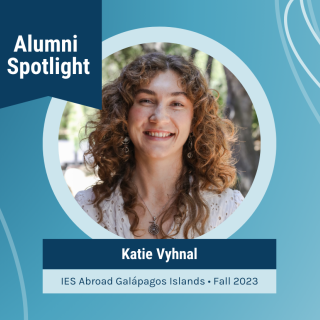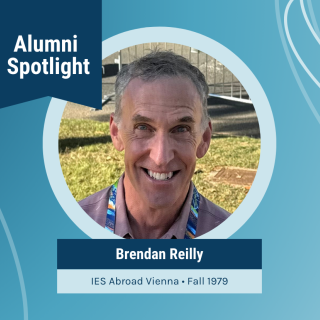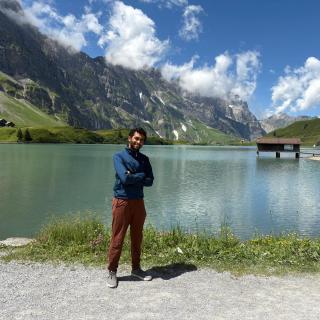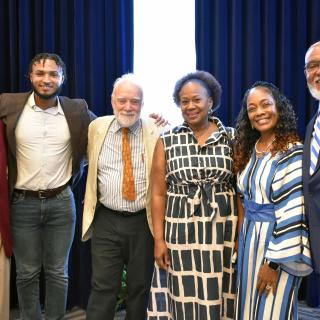Meet Christl Cozort (IES Abroad Nantes, Fall 1984 | University of Virginia), Interpreter at the European Commission. Studying French language as an undergraduate, Christl's study abroad experience inspired and prepared her for a career abroad. Read on to learn how Christl pursued her international career, the many languages she has added to her repertoire, and her advice to future study abroad students!
IES Abroad: What led you to study abroad in Nantes?
Christl Cozort (CC): As a French major, I had always wanted to study abroad, but back in the days before the Internet, I had little idea of how to arrange it and never thought I could afford it. It was only when I transferred to the University of Virginia, which had a dedicated Study Abroad Office, that I learned about programs like IES Abroad and found out that I could use financial aid to fund my stay.
I suppose I chose Nantes because I thought it would be less intimidating than a big city like Paris, and also because I’d never heard of it before!
IES Abroad: What are some of your most impactful study abroad memories?
CC: My most vivid memories of my semester in Nantes include visits to La Rochelle, Mont Saint-Michel, and the châteaux of the Loire Valley. I also remember the very elegant Madame Emilienne Rochet, the caretaker who made delicious pastries for every IES Abroad event and taught a group of us how to prepare duck, as well as Monsieur Nouailhat (pronounced “Nous Est La”). There was the Thanksgiving Dinner with pumpkin pies that many of the French people declined to eat, having been served too much pumpkin during the War. Another highlight was putting on Molière plays. And of course, the other students, with their different accents, styles, and what you might call “lifestyles” that didn’t always meet with their host families’ approval. Some of the people I met in Nantes are still among my best friends today.
IES Abroad: Where did your career take you after graduation? How did the skills you learned abroad transfer to your professional life?
CC: After graduating from college, I decided that I wanted to attend the Monterey Institute of International Studies (MIIS) and train to be a translator. I spent a couple of years working in a bookstore trying to save for the move and studying Russian in hopes of adding it to my combination of languages. Once at MIIS, I discovered I really loved interpretation, that my level of Russian was still too low to even think about interpreting it, and that my French, despite the tremendous boost my stay in Nantes provided, still wasn’t quite good enough either. After my first year at MIIS, I spent nine months in Paris at an interpreting school, and when not in class or practicing with other students, I read Le Monde from cover to cover every day, and explored the city.
IES Abroad: What led you to return abroad and establish your personal life and professional career in Brussels, Belgium?
CC: After finishing at MIIS in 1991, I decided to try my luck in Brussels. Then as now, it offered the best employment prospects for translators and interpreters because of the presence of many European institutions. I had contacts with some earlier MIIS graduates who helped me as I established myself as a freelance translator. I worked at a European news agency and gradually found other clients. My goal was still to become an interpreter, however, and for that I realized I would need at least one if not two additional foreign languages. I started learning German basically from scratch, and then added Dutch in a hurry after winning a contract with a US State Department agency to translate press articles.
IES Abroad: Can you tell us about some of the work you have done as an interpreter? What project are you most proud of?
CC: I had started interpreting for a few non-institutional clients, but didn’t take (and pass) the freelance accreditation test at the European Commission until 2003. I joined the permanent staff in 2008. Interpreting really is the best job in the world. We deal with every conceivable subject: agriculture, terrorism, the environment, trade, road safety, and taxation (not my favorite). My job has taken me to nearly every country in Europe, and even to China. I have done a few high-level meetings with heads of state and government, which are mostly scripted, but I actually find agriculture and customs meetings more interesting – they deal with concrete problems, and the delegates often really depend on the interpreters. If there’s a downside, it’s that English has become the dominant language in the EU. With 24 official languages in the EU, it’s simply not feasible to cater for all of them in every meeting, meaning that many participants will have to use a language other than their own and that will most often be English. Others feel it’s more “efficient” to speak English. It won’t be English as we know it, more what we call “Globish”, which enables them to communicate at some level. The future of interpretation looks rather bleak.
IES Abroad: Do you have any advice for students considering studying or interning abroad?
CC: If I had any advice for current students thinking about studying abroad, it would be: don’t hesitate, do it! I was terrified – Europe really was another world in 1984, and it wasn’t always easy even to make a phone call home, but it turned out to be the most valuable part of my college experience. It started me on the road to my current career. Also, if you’re in a non-English-speaking country, don’t just hang out with your English-speaking friends, really push yourself to speak, read, and listen to the host country language. I wish I had done that more.
IES Abroad: What's next for you?
CC: I’ll probably start working half-time soon, to spend more time with my new (Flemish, i.e. Dutch-speaking) husband and to pursue other interests. I’ve been working on Polish for several years and want to add it as a working language soon.
Learn more about studying abroad in Nantes, and check out all of our Alum of the Month profiles to see real examples of how study abroad changed the lives and careers of our former students. To help more students like Christl receive the option to study abroad, you can support our scholarships.





